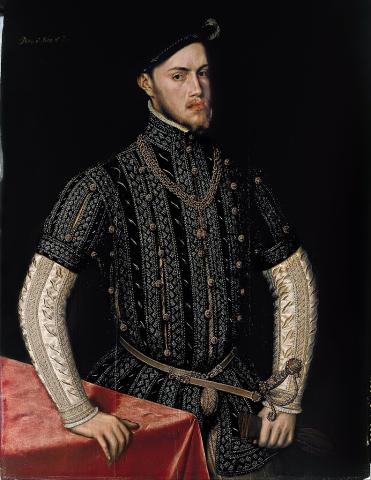Iuppiter adrīdēns vultū, quō sīdera lūstrat, 75
respondet dīvīs, quī petiēre simul:
‘gaudēte, ō superī, perstāre immōta potentis
prīncipis augustae maxima fāta volō.
Nec, licet adspiciat quāsdam nunc carpere rēgna,
dēspēret: capient mox sua fāta locum. 80
Nōn nisi per magnōs vincuntur magna labōrēs:
nec tulit ignāvōs rēgia celsa deōs.
Quōsque aliae spōnsōs captent, vīsuntur ubīque:
quem sibi fāta parant, nōn nisi summa tenet.
Haec reget imperium fēlīx, cum nūpserit, orbis: 85
pācātus dominae cēdet uterque polus.'
notes
Jupiter smiled and issued a reassuring prophecy: despite her doubts, Maria will make the best possible marriage and gain dominion over the whole world.
75 adrīdēns vultū: "smiling with respect to his face,” i.e. "with a smile on his face," a turn of phrase seen occasionally in Latin epic.
75 quō sīdera lūstrat: “with which (face) he surveys the stars.”
76 dīvīs: “to (the other) gods,” i.e. the ones who are asking which gifts the princess deserves.
76 petiēre: = petivērunt.
76 simul: "together," jointly" (OLD simul 4).
77-78 perstāre ... volō: reorder: volo maxima fata potentis principis augustae praestare immota, “I want the greatest fates of the powerful revered princess to remain unchanged.” There was evidently some anxiety that the planned marriage to Philip II would not come off. Indeed, in the end it did not, despite Jupiter's confident assurance. See below.
79 licet aspiciat: "even if (LS licet II) she should see," potential subjunctive.
79 quāsdam: "certain other women" in the court, perhaps other princesses.
79 carpere rēgna: "obtain kingdoms" i.e. through marriage.
80 dēsperet: jussive subjunctive with nec, “let her not despair!”
80 capient mox sua fāta locum: “soon her own fates will find their (own) place.” The words are vague and riddling, as befits a prophecy.
81 Nōn nisi per magnōs vincuntur magna labōrēs: supply regna with magna. "Only through great labors are great (kingdoms) conquered."
82 nec ... deōs: order: regia celsa nec tulit ignavos deos. “A lofty palace does not endure lazy gods.” Royal power and position come with hard work. The words are impressive but vague, as befits a prophecy.
83 captent: subjunctive in a relative clause of characteristic, quōsque aliae spōnsōs captent: “and (those spouses) whom the other (princesses) seek to catch.”
84 quem sibi fāta parant: “(the one) whom the fates are preparing for her (Maria).”
84 nōn nisi: "none except," "only."
84 summa: supply rēgna.
85 Haec: modifies felix, “this lucky princess.”
85 imperium orbis: "command of the world." At this time (early 1553) Maria was engaged to her cousin Philp II of Spain, then in his mid-20s. Philip was the son of Emperor Charles V, and had been governing the most extensive empire in the world since the young age of sixteen. At various moments in time he commanded lands in Europe, the Americas, Africa and Asia. But the engagement was broken at the last minute due to his father's desire for Philip to marry the new queen of England, Mary I, known as Mary Tudor.
- read more
-
"On 6 July 1553, Philip II’s aunt, Mary Tudor (1526–1558), ascended the English throne. Emperor Charles V wanted to take advantage of this unexpected windfall, and promised Mary his son’s hand. Charles forced Philip II to break off the Portuguese match with Infanta Maria, ordering him instead to marry the English queen. By late summer of 1553, this turn of events grew into a political crisis which shook the Portuguese royal family and Infanta Maria to the core. Especially, because the marriage contract between Infanta Maria and Philip, with the princess’ substantial dowry, had been settled upon, and the necessary papal dispensation regarding their consanguinity had been requested in Rome. Infanta Maria was seen by her family and King João III as good as married to her first cousin. Queen Leonor’s gambit would fail once again, and this time certainly not because of Anthonis Mor and the superlative portrait he had made of her daughter. There was little leverage for Philip II to negotiate or refuse his father’s wishes, and the prince complied. The Emperor saw greater advantages with an English match over a Portuguese one. But, as late as August of 1553, Philip promised in a letter to the Lisbon court he would marry Infanta Maria. King João III was enraged and sent a special ambassador to Brussels to discuss the broken engagement with the Emperor, but Charles V felt no need to justify his decision, and refused to even discuss the matter further with the Portuguese envoy." Annemarie Jordan Gschwend, "The Queen's Gambit: Infanta Maria of Portugal the Duchess of Viseu, the Court Painter Anthonis Mor, and Fake News at the Lisbon Court," Portuguese Studies Review 30.1 (2022), 83-112, at pp. 98-99.
85 cum nūpserit: “when she has married,” future perfect > nubō.
86 uterque polus: each pole, i.e. each Hemisphere. This concludes the nymph's quotation of Jupiter's prophecy.
vocabulary
Iuppiter Iovis m.: Jupiter
arrīdeō (adrīdeō) –rīdēre –rīsī –rīsus: to smile at or upon, especially approvingly
lūstrō lūstrāre lūstrāvī lūstrātus: to survey
perstō perstitī perstātum: to continue standing; remain fixed; persist
immōtus –a –um: unmoved, unchanged
augustus –a –um: august, revered
licet: (impersonal verb) it is permitted; even if (+ subj.)
carpō carpere carpsī carptum: to pluck, seize; criticize, carp at
dēspērō dēspērāre dēspērāvī dēspērātus: to despair (of)
ignāvus –a –um: lazy, idle
rēgia rēgia f.: a palace (> regius, a, um, sc. domus)
celsus –a –um: high, lofty
sponsus –ī m.: fiancé
captō captāre captāvī captātus: to grasp at, seize
vīsō vīsere vīsī vīsus: to see
ubīque: anywhere, everywhere
nūbō nūbere nūpsī nūptum: to marry
pācātus –a –um: peaceful, calm, tranquil, pacified
polus –ī m.: the celestial pole; (meton.), the heavens, sky; air

